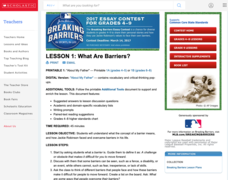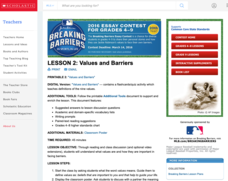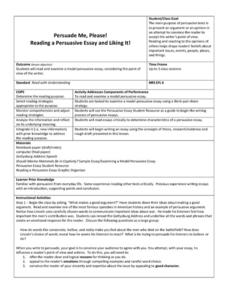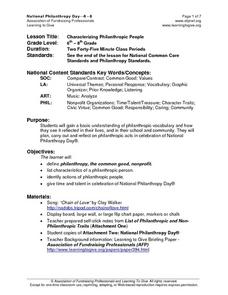PBS
WWII: Detained
Imagine being forced against your will behind barbed wire for doing nothing but being yourself. Scholars investigate the impact Japanese-American internment camps had during World War II. Through video and archival evidence, they create...
PBS
Women's History: Glass Windows; Glass Ceilings
Discover stories about women's history in beautiful stained glass windows. The second in a three-part series teaches scholars about a famous artistic style of stained glass windows and the influential women that used art to impact...
PBS
Civil War: Blacks on the Battlefield
Imagine a war being fought to free slaves, with slaves on the front line. Scholars use primary documents, videos, and research in the second installment of a three-part series to guide their analysis of the first African-Americans on the...
Macmillan Education
Christmas: #SadTree
Christmas trees can be as large and elaborate as the tree in Rockefeller Center, or as small and understated as Charlie Brown's tree in A Charlie Brown Christmas. But where did the tradition of Christmas trees come from? An engaging...
Scholastic
Lesson 1: What Are Barriers?
Scholars discuss the concept of a barrier with a short passage on Jackie Robinson. The writing process begins with a paragraph and several other sentences about Robinson's unique traits that made breaking a barrier possible.
Scholastic
Lesson 2: Values and Barriers
Scholars investigate and discuss the importance of values and how they can be used to break barriers. Small groups work collaboratively to examine the text and draw inferences to answer questions. A writing assignment challenges pupils...
Jamestown-Yorktown Foundation
What Was Everyday Life like in Colonial Virginia?
After reflecting on jobs people perform in the present day, scholars discuss what they believe jobs would have been like in Colonial Virginia during the American Revolution. Small groups then perform a jigsaw using informational packets....
Jamestown-Yorktown Foundation
How Did Relations between Britain and the Colonies Change after the French and Indian War?
What does the French and Indian War have to do with the American Revolution? Following the war, Britain issued the Proclamation of 1763 in an attempt to limit the colonists' western expansion. To understand how the proclamation, the...
Jamestown-Yorktown Foundation
Why Did Some Colonial Virginians Continue to Support the King?
Not all colonials supported the American Revolution. A resource from the American Revolution Museum at Yorktown ask young historians to investigate the reasons why some colonial Virginians were loyalist and continued to support King...
Teaching American History
Interpretation of the Declaration of Independence
Ready to interpret the Declaration of Independence and understand its meaning? The resource divides scholars into pairs, where they work as a team to match translations with excerpts from the declaration. The class then engages in...
Jamestown-Yorktown Foundation
Why Did Some Colonial Virginians Seek Independence?
To understand the reasonings of those colonials who sought independence from England, young historians are divided into content groups that examine documents related to either the Boston Tea Party, the Yorktown Tea Party, Tea Overboard,...
PBS
Taking A Field Trip
Field trips require a great deal of advanced planning to be successful. Ensure the success of your trips with a step-by-step preparation guide that itemizes before, during, and after activities as well as extension and adaptation...
PBS
Predicting/Making a Hypothesis
As an introduction to the hypothesis and testing method of investigation, young history detectives engage in a special investigation of a family artifact. After watching a short video that demonstrates the method, they develop a...
National Endowment for the Humanities
Background on the Patriot Attitude toward the Monarch
Learners explain the Patriot attitude toward the British monarchy, which helps them embrace the Founders' reluctance to have a strong executive under the Articles of Confederation as well as their desire to build in checks of executive...
Tennessee State Museum
Deciphering the Document: Unlocking the Meaning of the Emancipation Proclamation
Help your learners truly understand the Emancipation Proclamation by asking them the put it into their own words. After reading the document out loud to the class, and briefly discussing the legal language, split your class into small...
Curated OER
Persuade Me, Please! Reading a Persuasive Essay and Liking It!
Persuade your writers that crafting arguments is not that difficult. They only need to follow the steps outlined in this resource.
Albert Shanker Institute
Economic Causes of the March on Washington
Money can't buy happiness, but it can put food on the table and pay the bills. The first of a five-lesson unit teaches pupils about the unemployment rate in 1963 and its relationship with the March on Washington. They learn how to create...
Curated OER
Clearing the Smoke About Cigarettes
Students explore the many causes and effects of cigarette smoking in order to create anti-smoking campaigns geared towards other students.
PBS
Primary Sources
Learners see how to use primary and secondary sources to investigate history. Whether it is a photograph, book, map, letter, postcard, newspaper, or official document, students can use sources to reconstruct and relive history.
Alabama Learning Exchange
Interactive Reading Project
Students discuss books they are reading during the semester through e-mail with other students. They complete a reading interest survey, e-mail their partner weekly, and read and suggest six novels by the end of the semester.
Scholastic
Health Literacy and Drug Abuse
Students brainstorm about the different health issues facing teens today. In this health science lesson, students discuss the danger associated with drug abuse. They recommend ways to stay healthy.
Curated OER
Lattimer Massacre: What's Beneath the Surface?
Middle schoolers research the growth of unions due to issues related to the Lattimer Massacre. They research primary source documents and create posters, skits and role plays.
Curated OER
Lesson One: Characterizing Philanthropic People
Familiarize your class with philanthropy and involve individuals in philanthropic activities. First, determine the traits of philanthropic people. Class members attach sticky notes with character traits written on them to each side of at...
Other popular searches
- European Union Objectives
- Health Education Objectives
- Subjective and Objective
- Drama Lesson Plans Objective
- Objective Description
- Objective Complements
- Objective Case
- Concert Band Objectives
- Objective Subjective
- Abstract/non Objective Art
- Objective Case of Nouns
- Objective 6
























